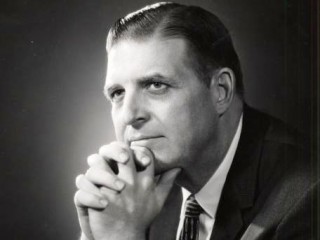
Carl F.H. Henry biography
Date of birth : 1913-01-22
Date of death : 2003-12-07
Birthplace : New York City, New York, U.S.
Nationality : American
Category : Famous Figures
Last modified : 2011-09-30
Credited as : theologian, evangelical Christianity,
0 votes so far
Henry's parents were German immigrants, his father Lutheran and his mother Roman Catholic, and they did not teach him much about religion. Later, working as a newspaper proofreader, he was struck by a co-worker's religious faith when she scolded him for taking God's name in vain. He grew curious about Christianity, and in 1933 he met an evangelist named Gene Bedford. "He told me about Christ as we drove around Long Island in my battered old Chevy," Henry told the New York Times in 1966, according to Goodstein. "I knelt in the back of that car and dedicated myself to Jesus Christ. Life has not been the same since."
In fall of 1935, he went to Wheaton College, where he met his wife, Helga Bender, and Graham. Henry earned a bachelor's degree in philosophy and a master's in biblical and theological studies at Wheaton, and later added a bachelor's degree in divinity and a doctorate in theology from Northern Baptist Theological Seminary and a doctorate in philosophy from Boston University. He helped found the National Association of Evangelicals and edited the books section of its magazine, United Evangelical Action.
Henry's career-defining year came in 1947, when he published the influential book The Uneasy Conscience of Modern Fundamentalism and became the first acting dean of the new Fuller Theological Seminary in Pasadena, California. His book came at a time when fundamentalist Christianity was in retreat. Fundamentalists had been responding to the early 20th century's increasing secularism and the rise of liberal Protestantism by withdrawing from the mainstream and preserving their churches. Henry's book encouraged conservative Protestants to engage in society and apply their values to issues such as racial integration, militarism, and labor and management issues. The book "came just as Billy Graham was preaching, and many people believe, as I do, that Henry and Graham, together, sparked the renewal of evangelicalism," Charles Colson, founder of Prison Fellowship Ministries and a former counsel to President Richard Nixon, told the Chicago Tribune.
Henry avoided the term fundamentalist, which he thought had developed a quarrelsome connotation, and preferred the term neo-evangelical-which means someone born again as a Christian who believes in interpreting the Bible literally and spreading the faith. In 1955, Graham decided that the newly energetic movement needed a magazine to display its intellectual ideas and counter the liberal publication Christian Century, and he proposed Henry as its first editor. Henry agreed, and he edited Christianity Today from its 1956 debut until 1968, keeping the magazine focused on ethics, theology, and insistence that the Bible is historically true. In 1957, he published another of his influential books, Christian Personal Ethics.
After leaving the magazine over conflicts with its board, Henry taught and gave lectures around the world and worked with Prison Fellowship Ministries and the Christian relief and development group World Vision International. In the late 1970s, he started writing his landmark six-volume work, God, Revelation and Authority, published in 1983. An interviewer asked him why he decided to take on such a huge writing project, and he replied, according to the Washington Post 's Adam Bernstein, "First, because our generation largely settles for grime when it could reach for glory; it is indifferent to spiritual value. Secondly, because God isn't bullish either on the Communist world or on the free world or on present-day America. Thirdly, because the problem of authority, which haunts all arenas of thought and life today, turns ultimately on the reality of God in His revelation."
In Henry's 1988 book Twilight of a Great Civilization: The Drift Towards Neo-Paganism, he criticized American society for becoming more secular. In his later years-frustrated by the scandals among popular evangelists in the 1980s, among other things-he criticized the movement he had once pushed to engage more in society for going too far in that direction and losing some of its identity.
Henry led the evangelical movement "out of the margins of social, political, and academic life to where today we are mainstream Protestantism, a powerful intellectual and political force," Fuller Theological Seminary President Richard J. Mouw told the Los Angeles Times. "Without his rigorous thought and his determined will," Christianity Today 's Neff told the same publication, "evangelicalism's premiere institutions would have been clearly second-rate."
Henry died of a heart ailment in Watertown, Wisconsin, on December 7, 2003. He is survived by his wife, his daughter, Carol; three sisters, and four grandchildren. His son, Michigan congressman Paul Henry, died in 1993.
















